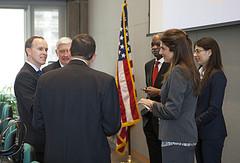 To think the Civil Society as an important actor politician inside of the context of a democracy, means to think about the real conditions of its legitimacy and about the maintenance of a possible autonomy. When mattering of Lipset (2001) the aspect of the education for the maintenance of the democratic values and practical support its, can at the beginning indicate in this author a contribution for this quarrel proposal of this given text the importance of this in the formation of consciences for a culture politics that supports and legitimizes the democratic institutions. III – VALUES PS-MATERIALISTAS OF the CULTURE POLITICS an important author who inside brings used significant contributions in this work for the agreement of the autonomy of the civil society of the phenomenon of the change politics in the transistion phase enters the authoritarian regimen for the democratic one is Ronald Inglehart (1993). When approaching the influence of the values after-materialists and auto-expression in the sphere of the culture politics, the author brings the thesis of that the development of the societies is tied with the syndrome of previsible changes of absolute social norms, in direction the more rational, tolerant, confident values each time and after-modern. For Inglehart (1996) the economic development brings a gradual change, of values of survival for the calls values of auto-expression, what it helps to explain why the societies richest have greater probability to be democratic. Exactly before the third wave of democratization, Inglehart (1993) it argues that ‘ ‘ the gradual substitution of materialistic values for values after-materialists was moving the priorities of the people of a primary focus in the search of the survival necessities, in direction to an increasing emphasis in autonomy auto-expresso’ ‘ (Inglehart, 1993, P. 6). Moreover, another factor favorable to the democracy is what it intitles of cognitiva mobilization, therefore beyond make reference to reference again the increasing levels of education, approaches the accomplishment of tasks that more require specialized knowledge as essential for the democratization of the societies.
To think the Civil Society as an important actor politician inside of the context of a democracy, means to think about the real conditions of its legitimacy and about the maintenance of a possible autonomy. When mattering of Lipset (2001) the aspect of the education for the maintenance of the democratic values and practical support its, can at the beginning indicate in this author a contribution for this quarrel proposal of this given text the importance of this in the formation of consciences for a culture politics that supports and legitimizes the democratic institutions. III – VALUES PS-MATERIALISTAS OF the CULTURE POLITICS an important author who inside brings used significant contributions in this work for the agreement of the autonomy of the civil society of the phenomenon of the change politics in the transistion phase enters the authoritarian regimen for the democratic one is Ronald Inglehart (1993). When approaching the influence of the values after-materialists and auto-expression in the sphere of the culture politics, the author brings the thesis of that the development of the societies is tied with the syndrome of previsible changes of absolute social norms, in direction the more rational, tolerant, confident values each time and after-modern. For Inglehart (1996) the economic development brings a gradual change, of values of survival for the calls values of auto-expression, what it helps to explain why the societies richest have greater probability to be democratic. Exactly before the third wave of democratization, Inglehart (1993) it argues that ‘ ‘ the gradual substitution of materialistic values for values after-materialists was moving the priorities of the people of a primary focus in the search of the survival necessities, in direction to an increasing emphasis in autonomy auto-expresso’ ‘ (Inglehart, 1993, P. 6). Moreover, another factor favorable to the democracy is what it intitles of cognitiva mobilization, therefore beyond make reference to reference again the increasing levels of education, approaches the accomplishment of tasks that more require specialized knowledge as essential for the democratization of the societies.
